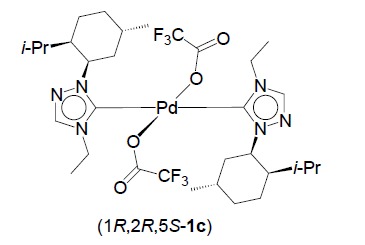This innovation is a novel series of chiral palladium-N-heterocyclic carbene (Pd-NHC) complexes that exhibit remarkably potent and selective anti-cancer properties. The lead compound, (1R,2R,5S)-1c, along with its enantiomer, (1S,2S,5R)-1c, demonstrates superior inhibition of cancer cell proliferation compared to the clinically used chemotherapy drug Cisplatin. These Pd-NHC complexes were synthesized in optically pure form and evaluated in vitro against multiple human cancer cell lines, including MCF-7 (breast), HeLa (cervical), A549 (lung), and B16-F10 (skin), and were also screened for cytotoxicity in normal cells (L929 fibroblasts). The most active complex, (1R,2R,5S)-1c, displayed nanomolar to low micromolar IC50 values, indicating significant cytotoxic potential. Comparative studies confirm that this new class of compounds outperforms both Cisplatin and Pd-NHC compounds reported in the prior literature.
Despite decades of clinical use, Cisplatin and other platinum-based chemotherapeutic agents face critical limitations, including non-selective toxicity that harms healthy tissues, the emergence of drug resistance in tumors, limited efficacy against certain cancer types, and severe systemic side effects such as nephrotoxicity, neurotoxicity, and gastrointestinal complications. These drawbacks highlight an urgent need for next-generation metal-based anticancer agents that demonstrate greater selectivity for cancer cells, reduced toxicity to normal cells, effectiveness at lower doses, and broader applicability across diverse cancer types.
- Stereochemically Defined Design: The Pd-NHC complexes were synthesized with precise stereochemical control, enhancing molecular recognition and bioactivity.
- Enantiomer-Specific Activity: Testing of both enantiomers revealed significant differences in anticancer potency, underscoring the role of stereochemistry in therapeutic effect.
- Potent Lead Candidate: The (1R,2R,5S)-1c compound exhibited strong cytotoxicity with an IC50 of 550 ± 20 nm against MCF-7 cells and low micromolar activity against HeLa, A549, and B16-F10.
- High Selectivity Index: (1R,2R,5S)-1c demonstrated ~8-fold greater toxicity toward cancer cells than normal L929 cells, indicating promising cancer selectivity.
- Superiority to Cisplatin: Compared to Cisplatin, the lead compound is ~27× more potent against MCF-7 and ~4× more potent against HeLa, offering a next-gen alternative.
- Improved over Prior Pd–NHCs: The compound surpasses earlier Pd-NHC complexes from Ghosh and Haque in terms of IC50 values and selectivity, marking significant advancement.
- Drug-Like Properties: These air- and moisture-stable complexes are synthetically accessible and suitable for further pharmaceutical development and formulation.
A library of chiral Pd-NHC complexes was synthesized via stereoselective pathways, with enantiomeric purity confirmed through optical rotation ([α]D25) and spectroscopic techniques such as NMR. The anticancer potential of these compounds was assessed in vitro using the Sulforhodamine B assay across multiple human cancer cell lines, including MCF-7 (breast), HeLa (cervical), A549 (lung), and B16-F10 (skin), along with the normal skin fibroblast cell line L929 for cytotoxicity comparison. IC50 values were calculated across replicates to ensure statistical reliability. Additionally, side-by-side comparative studies with Cisplatin and previously reported Pd-NHC complexes were conducted, allowing direct benchmarking of anticancer activity and potency.
This invention is at proof of concept stage that needs further development for preclinical and clinical studies. It is in a new drug discovery track for anticancer studies and would be a milestone in cancer therapy if taken to completion.
3
The invention offers a next-generation alternative to platinum-based chemotherapy with notable advantages. With enhanced potency at lower doses, the Pd-NHC complexes reduce drug load and treatment costs while exhibiting significantly lower toxicity, leading to fewer side effects and better patient quality of life. Their enantiomer-specific activity supports personalized and targeted therapy with high cancer cell selectivity. Effective against drug-resistant cancers, these compounds also promise to reduce healthcare burdens linked to hospitalization and toxicity management in conventional chemotherapy.
- Pharmaceutical and Biopharmaceutical industry
- Oncology drug development
- Precision and targeted chemotherapy
- Medicinal Inorganic chemistry
- Drug discovery platforms for Chiral metal complexes
- Academic and industrial cancer research labs
Geography of IP
Type of IP
201721000741
380602

